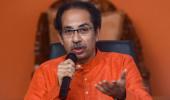'Whatever duties I have to dispense off as a Speaker, I will do the needful in accordance with the provisions of the law.'

Maharashtra Assembly Speaker Rahul Narwekar, on whose shoulders now lies the responsibility to decide the disqualification of 16 MLAs of the undivided Shiv Sena, as ruled by the Supreme Court order on May 11, tells Prasanna D Zore/Rediff.com that he will go by the provisions of the anti-defection law as envisaged in the Constitution and the Tenth Schedule.
Narwekar, who is currently in London on a "pre-decided" holiday, and who will now have to decide on the disqualification of 16 Shiv Sena MLAs, was once close to Uddhav and Aditya Thackeray and has had a political stint as an MLC with the Nationalist Congress Party before he quit the NCP in 2019 and got elected from downtown Colaba in Mumbai on a Bharatiya Janata Party ticket.
What is the most challenging task before you now given that the Supreme Court has asked you to decide upon the disqualification of the 16 MLAs of the undivided Shiv Sena?
Every task (before the Speaker) is as challenging or as simple. It becomes simpler when you have the Constitution to fall back upon.
Whatever duties I have to dispense off as a Speaker, I will do the needful in accordance with the provisions of the law.
What will be your guiding principles while giving your ruling?
The provisions of the Constitution as envisaged in the Tenth Schedule, the guidelines issued by the Supreme Court and the rules laid out for disqualification of the members of the House on grounds of defection will act as my guiding principles.
The Supreme Court has given you a 'reasonable period' to give the ruling on the disqualification. Is there a clear-cut guideline or any previous judgment from the Supreme Court that define what constitutes a 'reasonable period'?
No, not really. This is done on a case-by-case basis. (It) depends on the matter at hand and the legal interpretations and nuances involved (in deciding such issues).
There are so many petitions, facts are different and then one needs to follow certain legal procedures that are in consonance with the laws and Constitution.
There was a judgment given by Justice Rohinton Fali Nariman (last year) where he said (such matters) should be decided in three months, but that has been challenged before the larger bench. There is no definition (of what constitutes reasonable period) as such.

The Shiv Sena Uddhav Balasaheb Thackeray has asked for an early decision on the disqualification of 16 MLAs. The assembly session is due in July. Can we expect a ruling before the assembly session or after it?
It is difficult to state right now.
Will you be under pressure from both sides?
There is no question of pressure. I don't act under pressure.
The Supreme Court called your recognition of the chief whip and the leader of the Shiv Sena Legislature Party as contrary to law. How will you ensure neutrality when you set yourself to give a ruling on the disqualification of the 16 MLAs?
What they (the Supreme Court ruling) have mentioned is that the recognition of whip appointed by a section of the SSLP (Shiv Sena Legislature Party) is bad in law. They have said that the recognition of the whip should be on the basis of who has been appointed by the political party.
A political party as it existed before the split or after the split in Shiv Sena?
The political party at the time the petitions were filed.
That is what you would consider while giving your decision?
Yes.










 © 2025
© 2025